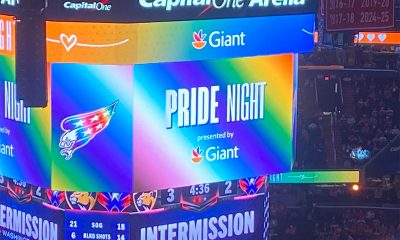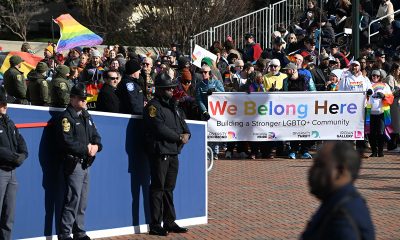District of Columbia
Gay Ward 1 Council candidate expresses ‘passion’ for public service
Brian Footer says listening to residents’ concerns is focus of campaign

Gay Advisory Neighborhood Commissioner Brian Footer, who has announced his candidacy for the Ward 1 D.C. Council seat up for election in 2026, says his campaign includes a diverse coalition of supporters dedicated to addressing the concerns of Ward 1 residents.
In an interview with the Washington Blade, Footer outlined his plans for addressing a wide range of issues impacting Ward 1 and the city as a whole, which he said affect all city residents, including LGBTQ residents.
“On the City Council I’m going to be especially focused on making housing more affordable, improving public safety, and making it easier to do business in our community,” he said. The needs and concerns of the city’s senior citizens is also an issue of great interest for him, he told the Blade.
“Public service is something that has always been ingrained in me,” he added. “And local government is where I’ve chosen to channel that passion, because it directly impacts people’s lives.”
Footer, a Democrat, initially will be running for the Ward 1 Council seat in the city’s June 16, 2026, Democratic primary. If he were to win the primary and the November 2026 general election, he would become the Council’s second openly gay member.
Incumbent Ward 1 Council member Brianne Nadeau (D) told the Blade last week that she wasn’t ready to discuss her plans for the future and whether she would run for re-election. Longtime Ward 1 community activist Terry Lynch has announced his candidacy for the Ward 1 Council seat as a Democrat.
Blade: Can you tell a little about your background, where you were born and raised and where you are from if you are not a native of the D.C. area?
Footer: I’m proud to say I’m a third-generation native of the D.C. area. From my grandfather’s dental practice just north of Dupont. From my parents meeting while working at G.W. Hospital. Or three generations of Footers attending the Hebrew School of Washington Hebrew. D.C. is my home and part of my family’s history.
And for the past 20 plus years as an adult gay man, D.C. has been my chosen home, in large part due to the vibrant and proud LGBTQ+ community. Public service is something that has always been ingrained in me. And local government is where I’ve chosen to channel that passion, because it directly impacts people’s lives.
I started my public service journey as a U.S. House page working for Dick Gephardt. And cut my teeth in local policy working for the New York City Council’s Speaker, Christine Quinn, managing her aging and veterans affairs portfolio. That’s where I got to experience how local government can truly impact people’s daily lives. …
I chose to extend my public service by first running for ANC in 2014…. And I came back to the ANC in 2022 and served as chair of 1E since then.
Blade: Can you say a little about how you describe your occupation and your working career?
Footer: I would say that I am an expert in the Older Americans Act. And that is an amazing space to make sure that we’re supporting our senior community to a place of dignity and respect. And so, I worked for government for many years, like 10 or 11 years. I started at the federal level, went down to the state level and eventually found my passion at the local level.
And that’s where I started getting my expertise in the aging space. And currently I work at KPMG as a healthcare consultant. And my clients there are the Center for Medicaid and Medicare Services.
Blade: Have you been involved in local D.C. community affairs for
a good amount of time?
Footer: Yes, in 2014 I decided to run for ANC. And as I mentioned, I have a passion for really getting into local issues. And so, running for ANC was an opportunity to extend my experiences and I’ve had an amazing time doing that. And then I ran for the Ward 1 Dems position. I was chair of that. And that took me through the 2016 presidential election.
And then in 2022 I decided to run again for ANC just a couple of blocks away. And I represent the southern part of Howard University and the northern part of Shaw. And I’m on the southern boundary of ANC 1 E, which represents Howard University, Park View, and Pleasant Plakins, with Georgia Avenue running through all SMDs [Single Member Districts].
Blade: What neighborhood do you live in now?
Footer: I live in the northern Shaw neighborhood, kind of the east side of U Street. So, I live in a building called Atlantic Plumbing. It’s right next to the 9:30 Club.
Blade: You mention on your campaign website that you feel things are not going as well as they should in the city in a number of different areas. Can you tell a little about what those areas or issues are and what you would do to correct or fix them?
Footer: So, on the City Council I’m going to be especially focused on making housing more affordable, improving public safety, and making it easier to do business in our community. And these are urgent issues. And people need relief now, not a decade from now. And so, with respect to public safety, we have been given a false choice between law enforcement and compassionate long-term solutions that get people back on their feet.
We need both. And they have to be coordinated. We have a lot of public safety programs in place, but they’re not working because we’ve thrown everything at the wall and aren’t doing any one of them very well. We have the information and data about crime and safety in Ward 1 to focus on targeted policies that will actually work if only we’re committed to them and follow through. I mean better coordination between agencies, more consistent support for violence prevention programs, and urgent improvements for things like street lighting, trash, and behavioral health services. So, we need to feel safe and be safe. Right now, too many residents don’t feel either.
With respect for housing, the rent is too high. It is unaffordable for lots of families. And so, over the past 10 years, rent has increased more than 66 percent while the consumer price index for the area increased by approximately 25 percent; that means that rent prices have been increasing by a rate of more than double that of general inflation.
We’ve been given a false choice between supporting business or supporting renters. I’m in favor of working with the business communities to build as many new homes as possible. It doesn’t have to come at the expense of renters and owners’ rent. There are solutions that have been implemented elsewhere in the country we should emulate. We should use the power of local government to make it easier and cheaper to build while bringing renters and the business community to the table.
As for small businesses, there are plenty of good programs in D.C. to support small businesses. Right now, however, different parts of the D.C. government don’t talk to each other. And we’re putting the onus on business owners to navigate this bureaucratic maze. We should be making it a lot easier for entrepreneurs and small businesses to get the licenses they need, pay their people a living wage, and serve our community.
Blade: Can you say a little about the current Ward 1 Council member? Do you feel she is not doing what you feel should be done on these issues?
Footer: So, you know, what I’ll say about Council member Nadeau, she has served Ward 1 for many years. And I respect anyone who steps up for public service. Whether she decides to run again or not, my decision to enter this race comes from listening to neighbors who are ready for a new vision. One that’s focused on safety, stability, and a city government that truly works for everyone.
I’m not running against anyone. I’m running for the future of Ward 1. I bring a different leadership style. I listen first. I build coalitions. I act boldly and I follow through. This campaign is about what we can do differently and better to make people feel safe, supported, and seen. Ward 1 deserves that conversation no matter who is on the ballot.
Blade: The local D.C. government and its current laws, including the Human Rights Act, are recognized as being supportive of the rights of the LGBTQ community. As a gay candidate, is there anything else you think needs to be done to protect the rights and the wellbeing of the D.C. LGBTQ community?
Footer: I will say I’m proud to be a gay man and part of D.C.’s vibrant LGBTQ+ community. And my involvements in the community over the years have been both personal and political, from organizing alongside queer leaders, advocating for inclusive policies, to showing up for the community when it matters most.
In D.C., I have worked with and supported local LGBTQ+ groups in a variety of ways, from volunteering for the Victory Fund in my early career to organizing LGBTQ+ senior housing round tables for SAGE and other housing advocates. But beyond formal affiliations, my queer identity informs how I lead. It’s with empathy, resilience and a deep appreciation for chosen family and intersectionality.
That’s why I’m running – to make sure queer people in Ward 1 and across the city feel seen, heard, and supported. And just to answer your question a little more directly, I think that there are two things in particular that are going to be important that I want to work towards and bring a lot of attention to.
One of them is dealing with housing. LGBTQ+ seniors are twice as likely to live alone and four times less likely to have children compared to their non-LGBTQ+ peers. And so national surveys show that many LGBTQ+ seniors fear having to go back in the closet when entering assisted living or retirement communities or nursing homes. And so, stories of misgendering and lack of cultural competency among staff are common.
So, affirming and safe and affordable housing isn’t just about comfort. It’s about dignity and safety for our seniors. And the second topic we see a lot about is to support organizations like SMYAL, because up to 40 percent of youth experiencing homelessness in D.C. identify as LGBTQ+. So, we need to make sure that we have those services to support people.
Blade: The D.C. Council has been considering a proposal by Mayor Bower in her FY 2026 budget to repeal a law impacting restaurants and bars, including the city’s gay bars, known as Initiative 82 that was passed twice by voters in a ballot initiative, which calls for ending the so-called tipped wage and requiring the businesses to pay the full minimum wage to restaurant and bar workers. Businesses and many of the tipped workers say the law has had a devastating impact on the businesses and they support repealing it. Do you have a position on that?
Footer: I think this is a good example of what I’ve said before that we are consistently being given false choices, right? And so, I think that we need to do our due diligence in order to find what is the common ground. You won’t find a small business in D.C. that doesn’t want to pay their people a living wage. And so, the question becomes how do you support our small business community to be able to thrive and also make sure that they’re supporting their employees.
And so, the specifics of whether I would vote for repealing it – I would say I’m not in favor of repealing what the voters have now said twice. But I do think the economic situation of our city has changed since the last time the voters had the opportunity to address this issue. And so, I figure it’s the City Council and the mayor’s job and the city government’s job to find out how we can make sure we’re blending those two things. It shouldn’t have to be a binary choice.
Blade: So, at this point are you saying you would not support the full repeal of the law?
Footer: At this point I don’t know if I would support a full repeal.
Blade: One other issue we have learned is that another candidate, longtime community activist Terry Lynch, has entered the race for the Ward 1 Council seat. Have you had any interaction with him over the years?
Footer: I haven’t. I recently reached out to him, and we’re supposed to get together soon to catch up. But I’m not very familiar with Terry Lynch. I’m looking forward to meeting him
Blade: The local LGBTQ group GLAA DC, formerly known as the Gay & Lesbian Activists Alliance, issues ratings for candidates running for the D.C. Council and for mayor. They base their ratings on a candidate’s record on LGBTQ issues and their response to a questionnaire the group sends to all candidates. Two of the questions they always ask is do you support decriminalizing sex work between consenting adults and decriminalizing possession of recreational drugs such as cocaine. How would you answer those two questions?
Footer: We just started to do a lot more research into that. And I don’t have a position on that just yet. But you’re not the first person to bring up that topic. It’s definitely something we’re going to do research on and have a better understanding on how that directly impacts people in Ward 1. So, I’ll have a more formal answer and be able to talk through the specifics of that.
District of Columbia
Faith programming remains key part of Creating Change Conference
‘Faith work is not an easy pill to swallow in LGBTQ spaces’
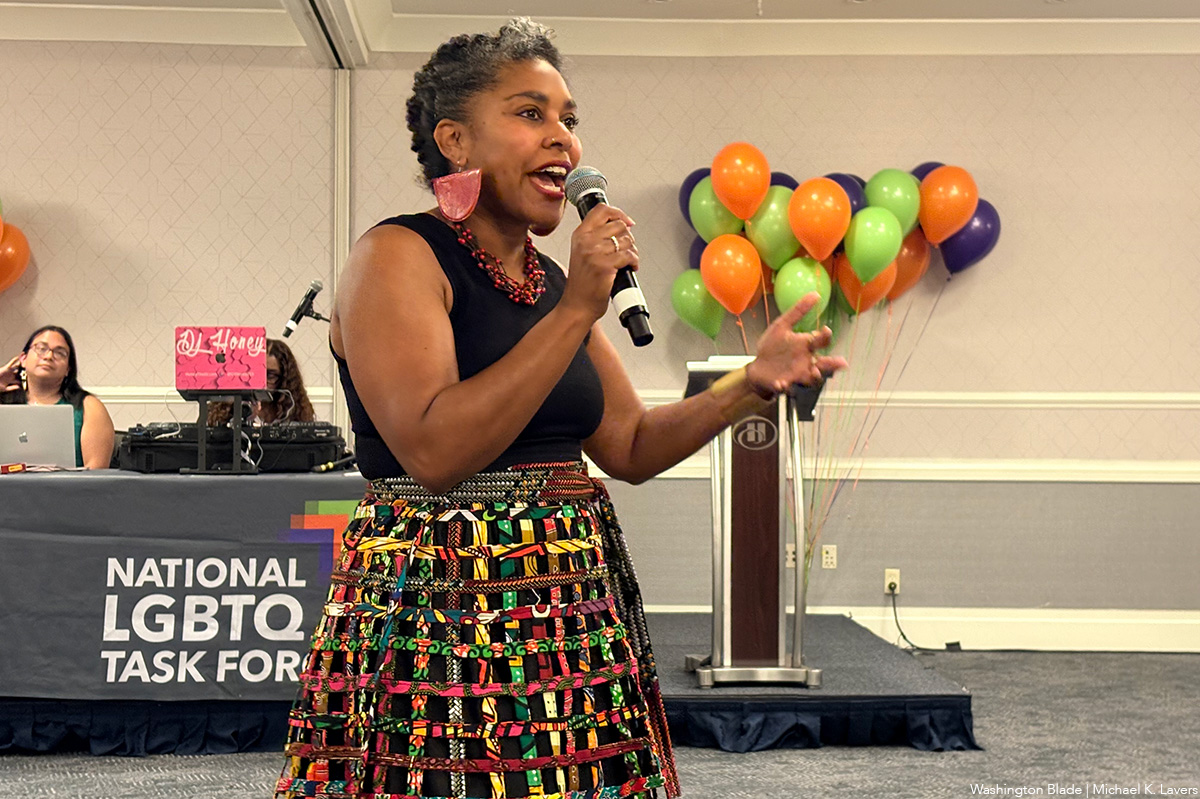
The National LGBTQ Task Force kicked off the 38th annual Creating Change conference in D.C. this week. This year, as with years past, faith and interfaith programming remains a key part of the conference’s mission and practice.
For some, the presence of faith work at an LGBTQ+ conference may seem antithetical, and Creating Change does not deny the history of harm caused by religious institutions. “We have to be clear that faith work is not an easy pill to swallow in LGBTQ spaces, and they’re no qualms about saying that we acknowledge the pain, trauma, and violence that’s been purported in the name of religion,” Tahil Sharma, Faith Work Director for the National LGBTQ Task Force, said.
In fact, several panels at the conference openly discuss acknowledging, healing from, and resisting religious harm as well as religious nationalism, including one scheduled today titled “Defending Democracy Through Religious Activism: A panel of experts on effective strategies for faith and multi-faith organizing” that features local queer faith activists like Ebony C. Peace, Rob Keithan, and Eric Eldritch who are also involved in the annual DC Pride Interfaith Service.
Another session will hold space for survivors of religious violence, creating “a drop-in space for loving on each other in healing ways, held by Rev. Alba Onofrio and Teo Drake.”
But Sharma and others who organized the Creating Change Conference explained that “a state of antipathy” towards religious communities, especially those that align with queer liberation and solidarity, is counterproductive and denies the rich history of queer religious activism. “It’s time for us to make a call for an approach to LGBTQ+ liberation that uses interfaith literacy as a tool rather than as a weapon against us,” Sharma explained.
Recognizing a local queer faith icon
Along with the panels, fighting religious nationalism and fostering communion with aligned faith activists and communities is at heart of this year’s faith work. As Sharma shared, “the person that we’re honoring this year for the faith award is Rev. Dr. Sofía Betancourt, and Dr. Betancourt is an amazing leader and someone who really stands out in representing UUs but also representing herself unapologetically.”
Based in the Washington, D.C. area, Dr. Betancourt has more than 20 years of experience working as a public minister, seminary professor, scholar, and environment ethicist, and public theologian. Her activism is rooted in her lived identities as a queer, multiracial, AfroLatine first-generation daughter of immigrants from Chile and Panama, and has been a critical voice in advancing the United Universalism towards anti-racist and pluralistic faith work.
Creating a faith-based gathering space
Sharma also said that faith fosters a unique space and practice to encounter grief and joy. For this reason, Sharma wants to “create a space for folks to engage in curiosity, to engage in spiritual fulfillment and grounding but also I think with the times that we’re in to lean into some space to mourn, some space to find hope.” The Many Paths Gathering Space serves this purpose, where visitors can stop for spiritual practice, speak with a Spiritual Care Team member, or just take a sensory break from the bustle of the conference.
This also means uplifting and foregrounding queer religious ephemera with an ofrenda to honor those who have passed, a display of nonbinary Korean American photographer Salgu Wissmath’s exhibition Divine Identity, and the Shower of Stoles, a collection of about 1,500 liturgical stoles and other sacred regalia representing the lives of lesbian, gay, bisexual, and transgender people of faith.
The Shower of Stoles
The collection was first started in 1995 by Martha Juillerat and Tammy Lindahl who received eighty stoles that accompanied them and lent them solace as they set aside their ordinations from the Presbyterian Church. The whole collection was first displayed at the 1996 General Assembly of the Presbyterian Church in New Mexico. The stoles, according to the Task Force, “quickly became a powerful symbol of the huge loss to the church of gifted leadership.”
Each stole represents the story of a queer person who is active in the life and leadership of their faith community, often sent in by the people themselves but sometimes by a loved one in their honor. About one third of all the stoles are donated anonymously, and over three-quarters of the stoles donated by clergy and full-time church professionals are contributed anonymously.
The collection shows “not just the deep harm that has been caused that does not allow people to meet their vocation when they’re faith leaders, but it also speaks to how there have been queer and trans people in our [faith] communities since the beginning of our traditions, and they continue to serve in forms of leadership,” Sharma explained.
Explicit interfaith work
Along with creating a sacred space for attendees, hosting workshops focused on faith-based action, and recognizing DC’s rich queer religious history, Creating Change is also hosting explicitly faith services, like a Buddhist Meditation, Catholic Mass, Shabbat service, Jummah Prayer Service, and an ecumenical Christian service on Sunday. Creating Change is also welcoming events at the heart of queer religious affirmation, including a Name/Gender/Pronoun/Identity Blessing Ritual and a reading and discussion around queer bibles stories with Rev. Sex (aka Rev. Alba Onofrio).
But along with specific faith-based programs, Sharma explained, “we’re looking to build on something that I helped to introduce, which was the separation of the interfaith ceremony that’s happening this year which is a vigil versus the ecumenical Christian service which is now the only thing that takes place on Sunday morning.”
This includes an Interfaith Empowerment Service this evening and an Interfaith Institute tomorrow, along with “Sing In the Revolution,” an event where folks are invited “to actually engage in the joy and rhythm of resolution and what that looks like,” Sharma said. One of the key activators behind this work is Rev. Eric Eldritch, an ordained Pagan clergy person with Circle Sanctuary and a member of the Pride Interfaith Service planning committee.
Affirming that queer faith work is part of liberation
The goal for this year, Sharma noted, alongside holding space and discussions about faith-based practice and liberation and intentional interfaith work–is to move from thinking about why faith matters in queer liberation spaces to “how is interfaith work the tool for how we’re engaging in our understanding of de-escalation work, digital strategies, navigating a deeper visioning that we need for a better world that requires us to think that we’re not alone in the struggle for mutual abundance and liberation,” Sharma explained.
It may surprise people to learn that faith work has intentionally been part of the National LGBTQ+ Task Force since its beginning in the 1980s. “We can really credit that to some of the former leadership like Urvashi Vaid who actually had a sense of understanding of what role faith plays in the work of liberation and justice,” Sharma said.
“For being someone who wasn’t necessarily religious, she certainly did have a clear understanding of the relationship between those folks who are allies, those folks who stand against us, and then those folks who sit in between–those folks who profess to be of religious and spiritual background and also are unapologetically LGBTQ+,” he continued.
This year’s faith programming builds on this rich history, thinking about “a way to kind of open doors, to not just invite people in but our people to go out into the general scene of the conference” to share how faith-based work is a tool, rather than a hindrance, to queer liberation work.
District of Columbia
Sold-out crowd turns out for 10th annual Caps Pride night
Gay Men’s Chorus soloist sings National Anthem, draws cheers
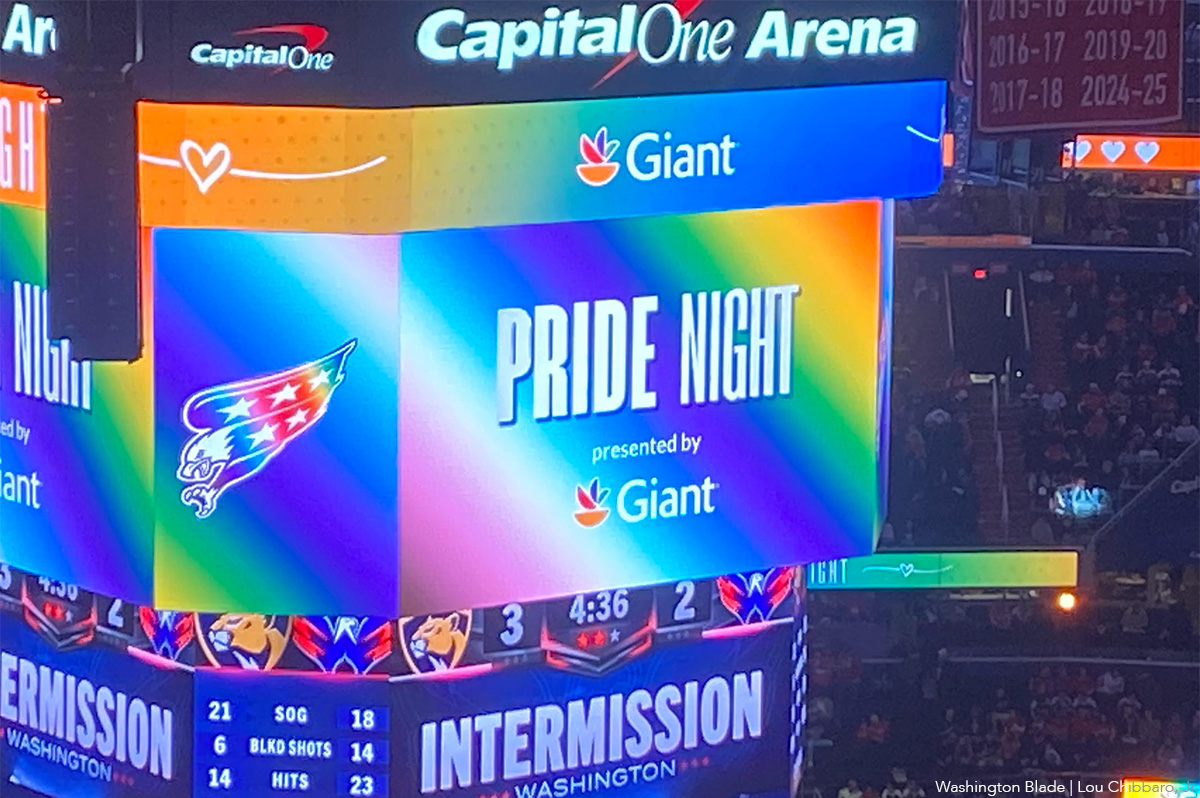
A sold-out crowd of 18,347 turned out on Jan. 17 for the 10th annual Pride Night at the Washington Capitals hockey game held at D.C.’s Capital One Arena.
Although LGBTQ Capitals fans were disappointed that the Capitals lost the game to the visiting Florida Panthers, they were treated to a night of celebration with Pride-related videos showing supportive Capitals players and fans projected on the arena’s giant video screen throughout the game.
The game began when Dana Nearing, a member of the Gay Men’s Chorus of Washington, sang the National Anthem, drawing applause from all attendees.
The event also served as a fundraiser for the LGBTQ groups Wanda Alston Foundation, which provides housing services to homeless LGBTQ youth, and You Can Play, a nonprofit organization dedicated to advancing LGBTQ inclusion in sports.
“Amid the queer community’s growing love affair with hockey, I’m incredibly honored and proud to see our hometown Capitals continue to celebrate queer joy in such a visible and meaningful way,” said Alston Foundation Executive Director Cesar Toledo.
Capitals spokesperson Nick Grossman said a fundraising raffle held during the game raised $14,760 for You Can Play. He said a fundraising auction for the Alston Foundation organized by the Capitals and its related Monumental Sports and Entertainment Foundation would continue until Thursday, Jan. 22
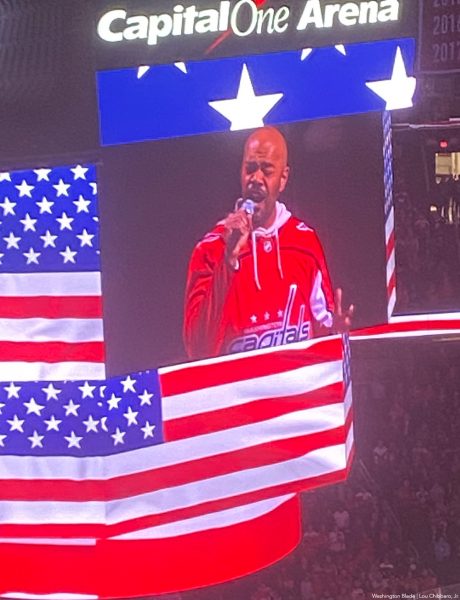
A statement on the Capitals website says among the items being sold in the auction were autographed Capitals player hockey sticks with rainbow-colored Pride tape wrapped around them, which Capitals players used in their pre-game practice on the ice.
Although several hundred people turned out for a pre-game Pride “block party” at the District E restaurant and bar located next to the Capital One Arena, it couldn’t immediately be determined how many Pride night special tickets for the game were sold.
“While we don’t disclose specific figures related to special ticket offers, we were proud to host our 10th Pride night and celebrate the LGBTQ+ community,” Capitals spokesperson Grossman told the Washington Blade.
District of Columbia
D.C.’s annual MLK Peace Walk and Parade set for Jan. 19
LGBTQ participants expected to join mayor’s contingent
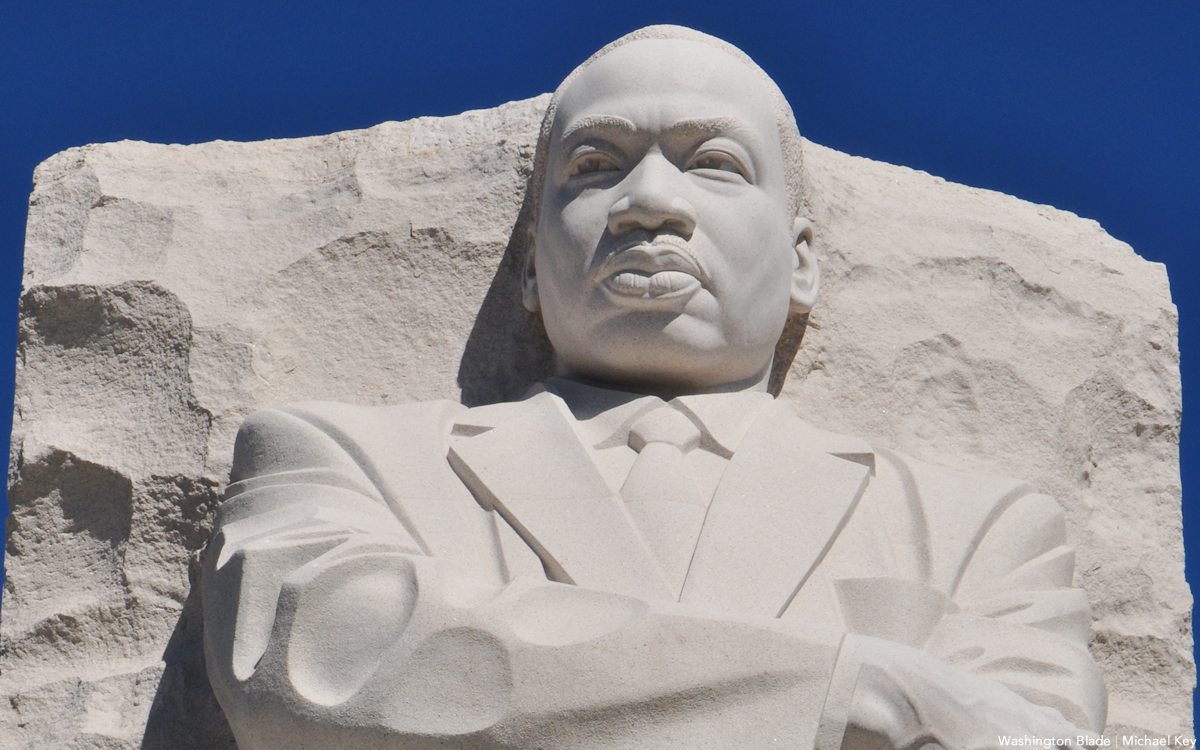
Similar to past years, members of the LGBTQ community were expected to participate in D.C.’s 21st annual Martin Luther King Jr. Day Peace Walk and Parade scheduled to take place Monday, Jan. 19.
Organizers announced this year’s Peace Walk, which takes place ahead of the parade, was scheduled to begin at 10:30 a.m. at the site of a Peace Rally set to begin at 9:30 a.m. at the intersection of Firth Sterling Avenue and Sumner Road, S.E., a short distance from Martin Luther King Jr. Avenue.
The Peace Walk and the parade, which is scheduled to begin at 11 a.m. at the same location, will each travel along Martin Luther King Jr. Avenue a little over a half mile to Marion Barry Avenue near the 11th Street Bridge where they will end.
Japer Bowles, director of D.C. Mayor Muriel Bowser’s Office of LGBTQ Affairs, said he and members of his staff would be marching in the parade as part of the mayor’s parade contingent. In past years, LGBTQ community members have also joined the mayor’s parade contingent.
Stuart Anderson, one of the MLK Day parade organizers, said he was not aware of any specific LGBTQ organizations that had signed up as a parade contingent for this year’s parade. LGBTQ group contingents have joined the parade in past years.
Denise Rolark Barnes, one of the lead D.C. MLK Day event organizers, said LGBTQ participants often join parade contingents associated with other organizations.
Barnes said a Health and Wellness Fair was scheduled to take place on the day of the parade along the parade route in a PNC Bank parking lot at 2031 Martin Luther King Jr. Ave., S.E.
A statement on the D.C. MLK Day website describes the parade’s history and impact on the community.
“Established to honor the life and legacy of Rev. Dr. Martin Luther King, Jr., the parade united residents of Ward 8, the District, and the entire region in the national movement to make Dr. King’s birthday a federal holiday,” the statement says. “Today, the parade not only celebrates its historic roots but also promotes peace and non-violence, spotlights organizations that serve the community, and showcases the talent and pride of school-aged children performing for family, friends, and community members.”

